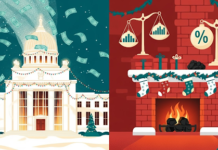Markets, yields, and the election—Barclays has a bold prediction.
With the U.S. elections just days away, analysts at Barclays are projecting a scenario of relative market calm in the aftermath, expecting a mild rally that could drive both bond yields and stock prices higher. Despite concerns of potential unrest, the strategists, led by Ajay Rajadhyaksha, believe that worries over a turbulent transition may be overstated. While some market players are eyeing potential disruptions, Barclays’ analysts are focusing on what they view as a more likely outcome: a “smooth transfer of power.”
This week, we’re examining this potential post-election rally and its impact on investors. In today’s main topic, we’ll discuss the expected resilience of the U.S. institutions in ensuring a peaceful transition, and why Barclays’ team is betting on risk assets to rally post-election.
And in our “This Week I Learned…” section, we’ll dive into how historical elections have shaped market resilience. In our Fun Corner, we’ll lighten things up with humor on election season—because who doesn’t need a laugh as we bite our fingers in anticipation of the election aftermath?
This Week I Learned…
Inflation Psychology Runs the Market
Did you know that consumer psychology has a lasting impact on inflation expectations? According to recent surveys by the New York Federal Reserve and University of Michigan, consumers expect inflation to stay above 3% for the next year—in line with the current core inflation rate. But why does this matter? It turns out that these expectations drive both wage negotiations and business planning.
For instance, workers who anticipate rising costs push for higher wages to maintain their purchasing power. This, in turn, forces companies to adjust their pricing strategies, creating a feedback loop of inflationary pressures. Take Boeing’s (BA) recent negotiations with labor unions as an example—higher wage demands are already reflected in the company’s multiyear contract offer.
In short, inflation isn’t just about numbers on a page—it’s about what people think is coming next. As history shows, when inflation expectations are entrenched, they can be tough to bring down, even with aggressive Federal Reserve policy moves.
The Fun Corner
Inflationary Wisdom
Want to hear a joke about inflation? Oh wait, it’s going up!
Okay, but seriously—did you know that inflation jokes are like interest rates? They’re only funny when they’re low!
Take a page from the traders’ handbook: If inflation gets out of control, some say the smartest move is to “short” your patience. After all, the only thing rising faster than prices is frustration!
Moderate Inflation Is Manageable—If Growth Persists
Inflation is back in the spotlight, but can stocks thrive in this environment? History says yes—as long as economic growth continues. In September, the U.S. Consumer Price Index (CPI) fell to 2.4%, while core inflation, which excludes volatile energy and food prices, remained at 3.3%. While these numbers signal a reduction in headline inflation, the core components—especially in non-energy services like healthcare and housing—still see brisk price increases.
The Federal Reserve now faces a difficult choice: either let interest rates stay elevated, or risk more inflation by cutting rates prematurely. Higher interest rates would likely slow down the economy, but not necessarily spell disaster for stocks. In fact, as long as GDP growth holds steady, stocks can continue to rise—even if inflation remains moderately elevated.
Take the 25 years before the Global Financial Crisis, when inflation averaged 3.1%. Despite this, the S&P 500 grew by 13.7% annually. Similarly, inflation has averaged the same 3.1% in the last two years, but stock prices surged by more than 20% annually. The message? Growth drives stock returns more than inflation alone.
As the Federal Reserve navigates these inflationary pressures, investors should monitor economic growth indicators. If growth falters, inflation could quickly become a bigger problem. But as long as corporate profits and job creation continue, moderate inflation won’t derail the market.
The Last Say
What’s Next for Inflation and Stocks?
As we wrap up this week’s Market Pulse, the key takeaway is clear: moderate inflation is something the market can handle—but only if growth continues. We’ve seen how economic expansion in the past has helped stocks navigate inflationary pressures, and there’s no reason to think it can’t happen again.
However, with inflation still above the Federal Reserve’s target and interest rates likely to stay higher for longer, it’s more important than ever to watch how corporate profits and job creation evolve. Growth remains the deciding factor. If it slows, the market could see turbulence. But if growth persists, even modest inflation won’t stop the momentum.As we look ahead, keep an eye on inflation data, corporate earnings, and Federal Reserve policy. The numbers may not always be pretty, but there’s still room for optimism—just remember to stay cautious and think long-term.

























